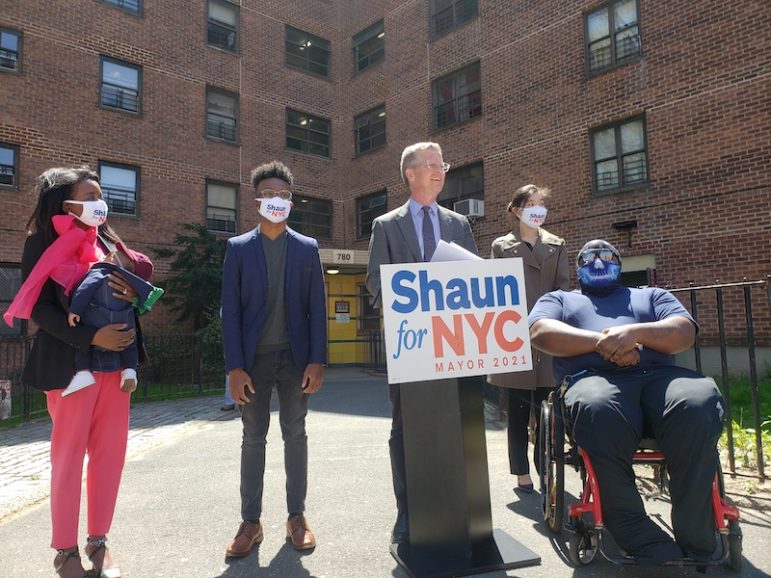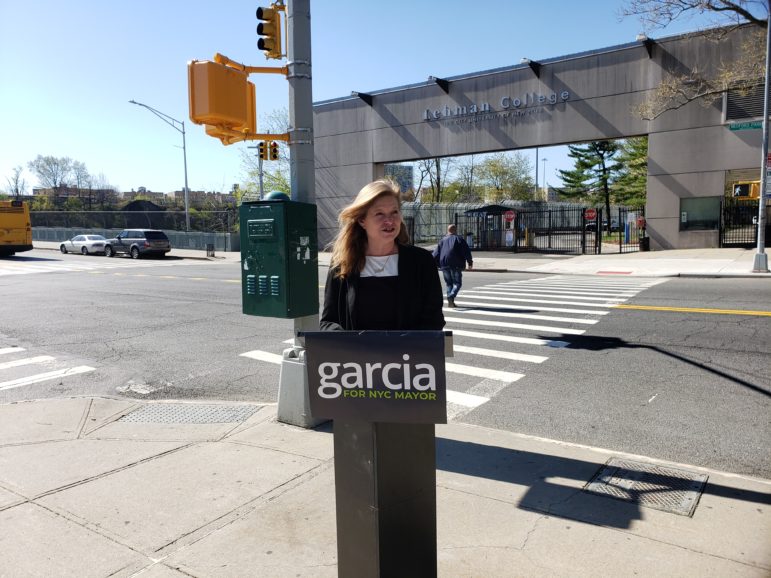Candidates also touted their cannabis industry plans and their Earth Day credentials.

Jarrett Murphy
Shaun Donovan discusses his NYCHA plan outside the Pelham Parkway Houses.Over the past week, candidates have had a couple fun themes to build their policy pronouncements around: the 4/20 marijuana celebration and Earth Day on April 22. And many took advantage, although others struck other notes as we moved within two months of Primary Day.
Mayoral candidate Ray McGuire offered his plan for creating an equitable cannabis industry, as did fellow mayoral hopeful Scott Stringer; Manhattan borough president candidate Brad Hoylman’s call for an aggressive outreach program to alert people to opportunities in the pot business got a boost from Whoopi Goldberg. Brooklyn borough president candidate Antonio Reynoso and Kathryn Garcia, who is running for mayor, called for curbside organics collection to be established permanently citywide, and Garcia also committed to spending 1 percent of the city budget on parks if she is elected—a longstanding ask of parks advocates. Andrew Yang released a climate resiliency plan.
Yang, the mayoral frontrunner, had a busy week, policy-wise. He announced a four-point plan to increase immigrants’ financial power by creating new paths to traditional banking and making it cheaper to send remittances to home countries (something he’d achieve through bulk purchasing those services and getting the state to “reduce regulatory burdens and commit to a more rapid permitting process for money service businesses for the future.” His opioid policy also requires action from the state—namely, decriminalizing needles and other paraphernalia—as well as improving access to buprenorphine. His wide-ranging food equity plan discusses improving access to safety-net benefits, boosting the quality of city-provided meals and looking out for the rights of food workers. And he called for a dramatic expansion of the Summer Youth Employment Program to 175,000 slots from the current 75,000.
The major mayoral candidate most critical of the NYPD, Dianne Morales, proposed a Community First Responders Department consisting of EMTs, counselors, social workers and “others trained in de-escalation and trauma-informed intervention” that would exist separate from the police department (within the city’s health department) and respond to 311 and 911 calls about New Yorkers experiencing homelessness, mental health crises and drug use. “We need to keep the police out of interactions where their presence is likely to do more harm than good,” Morales’ policy paper reads. “And we need to develop a network of care that can show up when it’s needed most.”
And mayoral candidate Art Chang publicized a 12-point “digital bill of rights” that calls for universal broadband, better online access to city services, privacy protections and “offline access to all information and resources for those who prefer not to use the Internet.”
Donovan: RAD ain’t so bad
Mayoral candidate Shaun Donovan touted his plan for NYCHA on Friday at the Pelham Parkway Houses, taking aim at Bill de Blasio, Andrew Yang and those who have depicted the federal Rental Assistance Demonstration (RAD) as a scheme to privatize public housing.
“At this critical moment in our city’s history, we need a mayor who understands these issues on a deeper level. We need a mayor who actually knows what they’re doing because they’ve done it their entire career,” the former city housing commissioner and federal housing secretary said. He went on to praise President Joe Biden for including $40 billion for public housing in his infrastructure bill. “I can confidently say that I can get more of that money to New York City than any other mayoral candidate,” Donovan boasted. “President Biden, Vice President Harris, members of their Cabinet and members of Congress—these are people I have deep personal relationships with, not just people I met backstage at a debate.” (The last bit was a clear dig at Yang, who has touted the bonds formed with Biden, Harris, Transportation Secretary Pete Buttigieg and others during his time as a presidential candidate in 2020.)
Donovan’s recipe for NYCHA includes snagging a lot of new federal money and investing heavily in energy efficiency, which would over time reduce operating costs as well as make NYCHA—famous for heat that either fails entirely or makes apartments unbearably hot—nicer to live in and more environmentally responsible. The heart of his plan, however, is the creation of a preservation trust to oversee repairs and the use of Section 8 vouchers to supplant shaky public-housing funding.
As it happens, de Blasio’s NYCHA plan includes Section 8 conversions, much of it under the RAD program, for 62,000 units of housing and a preservation trust to oversee repairs for the rest of NYCHA’s portfolio. But Donovan charges that de Blasio was slow to embrace RAD—it was created in 2012 but the city didn’t get its first project under way until 2017—and mishandled the roll-out in a way that fostered fears of privatization.
In the clip below, Donovan says he knows RAD is not a form of privatization, because he designed the program.
Garcia wants schools to build career paths

After the disruptions caused by COVID-19, the next mayor will have an opportunity (or maybe a necessity) to reset the conversation about New York City high schools—not just the very important questions about diversity, but the even more fundamental question of what they are for. For decades, critics have faulted the lack of connections between most U.S. high schools and viable job paths, and the prevalence of a model that focuses on general college prep. Garcia is pledging to change that by putting career counselors in every high school, getting the private sector to offer 10,000 paid internships to high school kids (with city-subsidized wages for kids who face extra barriers) and guaranteeing a job, among other steps.
Garcia touted the plan outside Lehman College in the Bronx on Friday. In the clip below, she talks about the broad shift in learning culture it will require.
With reporting by Hugh Murphy









